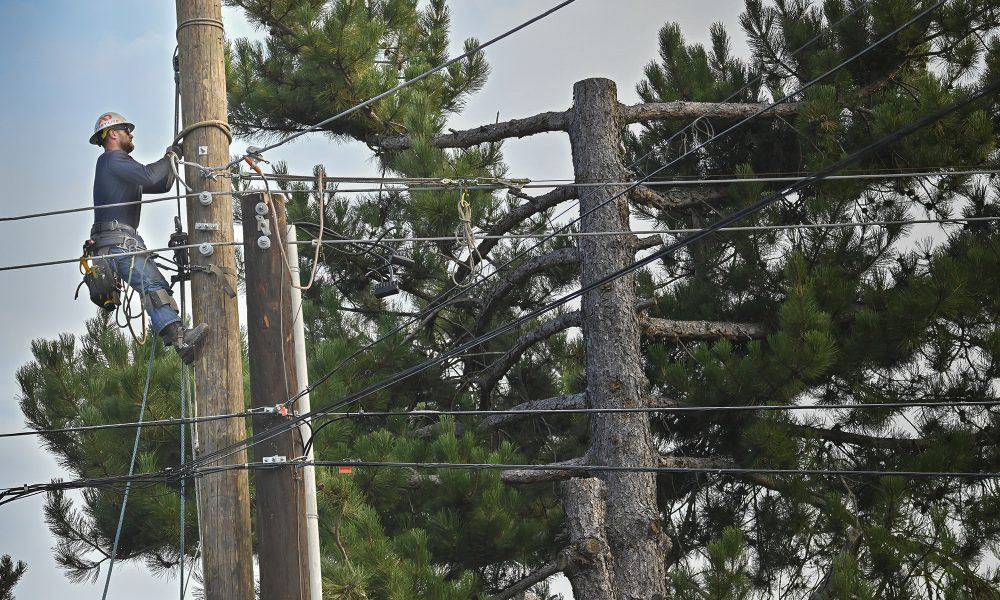Two Oregon utilities and the Confederated Tribes of Warm Springs will receive nearly $450 million from the federal government to modernize the region’s power grid and incorporate a growing amount of renewable energy.
The investment by the Biden administration will allow PacifiCorp, Portland General Electric, or PGE, and the tribe to boost transmission capacity and job training programs and fortify the electric grid from the growing threat of wildfires.
“This is a tremendous opportunity that will open the potential for renewable energy development on the Confederated Tribes of Warm Springs Reservation to the economic benefit of the tribe and its membership,” Tribal Chairman Jonathan Smith said in a news release.
PacifiCorp will fully match the federal funds allocated for its projects, according to Rohit Nair, the company’s director of engineering standards and grid modernization
“This is a once-in-a-generation opportunity to secure significant federal funding for programs that support our customers, especially those in historically underrepresented and marginalized communities,” he said in a statement.
The money is part of $3.5 billion the Biden administration announced this week for states to upgrade their electric grids to make them more resilient to climate disasters and to support clean energy development.
Portland General Electric and the Confederated Tribes of Warm Springs will use $250 million to update a 60-year-old transmission line between the Pelton-Round Butte hydropower facility on the Deschutes River and PGE’s customers west of the Cascades. The new transmission line will carry more electricity from the dam and other renewable sources being developed on the tribe’s land to meet growing residential and commercial demand for electricity in western Oregon, where PGE serves about 900,000 customers.
PGE will get an additional $50 million to help with the costs of new artificial intelligence software and smart meters that can connect small-scale energy sources and batteries – such as rooftop solar panels or electric vehicle batteries – to the larger electric grid. Such software can help balance energy across the grid, pulling it from homes with solar panels or plugged-in electric vehicles, and redistribute the energy back to the grid when needed. The software can also predict conditions that could cause power outages.
PacifiCorp, which serves about 600,000 customers in Oregon, will receive nearly $150 million to fortify the electric grid across its service areas against wildfires and floods and to boost workforce development.
In June the company was ordered to pay more than $70 million to 17 homeowners who suffered damages during the 2020 Labor Day wildfires, and will potentially pay billions more as the result of a class action lawsuit by thousands of Oregon homeowners. A jury found the company guilty of negligence for failing to shut off power to its customers during a windstorm despite warnings from fire officials and for failing to maintain vegetation around power lines, allowing the fires to ignite and spread.
The company said it plans to update substations to reduce power outages by 50% and to end flood-related outages that affect the Yurok Tribe along the southern Oregon and northern California border.
The company will also work with the tribe on plans to meet electricity needs on it’s land that borders a 44-mile stretch of the Klamath River. Over 40% of the Upper Yurok reservation has no access to electricity, including an elementary school that operates on a generator.
PacifiCorp will also expand its apprenticeship program with the tribe; a nonprofit that trains people across several Oregon southern counties and in California, Crater Lake Electrical Joint Apprenticeship Training Center; and Utah State University. The company proposed training at least 100 people from the Yurok Tribe in the electrical trades, and training more than 400 people from “disadvantaged communities” in coming years.
The federal funds will also support equity and inclusion training for PacifiCorp executives and managers to decrease disproportionately high turnover rates among the company’s “diverse employees.”
To gird the grid against wildfire, the company will replace existing infrastructure with fire-resistant poles, non-explosive fuses and will replace bare overhead wires with covered ones. It’s also investing in software that can run weather research and forecast models four times faster than current methods, and in cameras that use artificial intelligence to scan the landscape for smoke and that can detect, verify and classify wildfires and immediately alert fire officials.
Oregon Capital Chronicle is part of States Newsroom, a network of news bureaus supported by grants and a coalition of donors as a 501c(3) public charity. Oregon Capital Chronicle maintains editorial independence. Contact Editor Lynne Terry for questions: [email protected]. Follow Oregon Capital Chronicle on Facebook and Twitter.
STORY TIP OR IDEA? Send an email to Salem Reporter’s news team: [email protected].

Alex Baumhardt has been a national radio producer focusing on education for American Public Media since 2017. She has reported from the Arctic to the Antarctic for national and international media, and from Minnesota and Oregon for The Washington Post. She previously worked in Iceland and Qatar and was a Fulbright scholar in Spain where she earned a master's degree in digital media. She's been a kayaking guide in Alaska, farmed on four continents and worked the night shift at several bakeries to support her reporting along the way.









